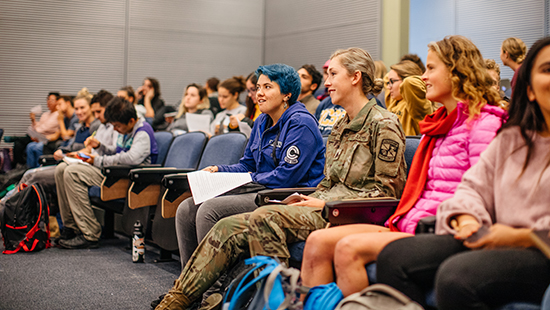
The UCLA Veteran Resources Center (VRC) is one of the most robust in the UC system. Its bustling calendar offers a diverse array of events, from relationship workshops to shared meals, volunteer opportunities, sporting events and more.
A three-step approach
Emily Ives, director of the Military and Veterans Affairs Program, explains that the program takes a three-step approach to supporting student veterans. The first step is the period from when potential students consider applying, up to their first day of school. This includes resources around applications, financial aid and preparing for college life. The second phase begins on the first day of school and lasts until a few months before graduation. Resources for this phase include making connections around the university; accessing tutoring, counseling and disability services; help to gain research, volunteer and employment opportunities; and connections to the other veterans’ resources UC provides. The third phase is the transition out of the university, including support with finding employment or transitioning to graduate school.
These efforts stretch far beyond the VRC, says Ives. “We work with our colleagues throughout the university to support our students in these areas. It’s integral to student success that our partners around campus understand the student resources and can help connect them.”
VRC staff cultivate relationships and identify point people in offices like disability services, so that when student veterans need support, they can talk to someone who understands their unique challenges and how to navigate the Veterans Association and other connected agencies.
Targeted support
Ives explains that UCLA resources and services are provided to a broader audience than specifically “veterans.” They serve all military-connected students — including children of military families, spouses of veterans, reservists, members of the National Guard, current military personnel and students whose siblings serve.
“These students have unique life experiences that aren’t shared by everyone on campus,” Ives explains. “Although they haven’t always served in the military, military service has greatly impacted their lives. They need a dedicated space where they can connect over shared challenges and successes in a place where people have a common understanding of their experiences.”
VRC staff provide targeted presentations to veteran students at occasions like prospective and admitted student events and orientations, making new students aware of the dedicated resources available to them. And, they collaborate with outside resources; for example, a Veteran Success on Campus (VSOC) vocational rehabilitation counselor employed by the Veterans Benefit Administration comes to campus three days a week to support students using their veterans’ education benefit.
Community connections
Enhancing its efforts to serve veterans is UCLA’s longstanding partnership with the VA Greater Los Angeles Healthcare System in West Los Angeles. To create a greater sense of community between veterans and UCLA students, some UCLA veteran programming is even housed on the VA campus.
The UCLA/VA Veteran Family Wellness Center offers comprehensive, holistic, resilience-based wellness services to all veterans and National Guard and reserve members, as well as their families (including children and extended family). The wellness center specializes in evidence-based programming. Recently, the VA and UCLA opened a Center of Excellence for Resilience and Recovery to address the linked problems of homelessness, mental health issues and substance abuse. It provides staff training, offers resources and promotes research development in this area, with veteran input.
The UCLA School of Law Veterans Legal Clinic develops the skills of law students while addressing veterans’ unmet legal needs. It is expanding the pipeline of future lawyers who will have the commitment, training and experience to represent veterans.
UCLA Athletics provides free or discounted tickets for veterans to every single UCLA sporting event. It also hosts several veterans and military-appreciation events, including a fantasy batting clinic at the Jackie Robinson Stadium. Additionally, it provides full scholarships to summer camps for veterans’ children and grandchildren.
A unique highlight of the UCLA/West Los Angeles VA partnership is a community garden. When the Student Veterans of America annual conference took place in Anaheim, they began to clean up the garden as a volunteer project. This project was kept up by the UCLA Student Veterans of America Club, which adopted it as an ongoing service project. After years of weekly clean-up efforts, the UCLA Student Veterans of America, in partnership with the UCLA Veteran Resource Center and UCLA Recreation, have built raised beds, started to create accessible pathways and cultivated new growth.
“The garden started like the wild west — tumbleweeds and everything,” recalls Ives. “Today, it is a refuge.” She explains that the UCLA Student Veterans of America Club established a partnership with a VA program that supports highly vulnerable veterans who take part in a structured daily program. Those veterans now spend part of each day in the garden, helping the UCLA students plant and maintain it. And, produce grown at the garden is now used in a VA Healthy Teaching Kitchen, which aims to improve veterans’ health by providing them with culinary skills and education around making healthy food choices.
“It’s special — that veteran-to-veteran connection. There’s nothing like it,” Ives says. “It’s really making a difference for everyone.”
Connect with the UCLA Veteran Resources Center.
